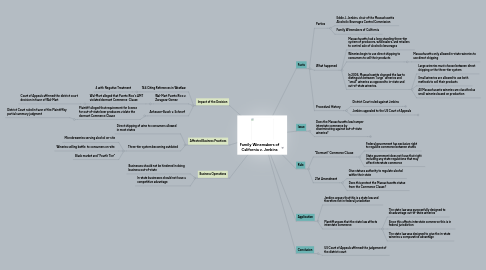
1. Facts
1.1. Parties
1.1.1. Eddie J. Jenkins, chair of the Massachusetts Alcoholic Beverages Control Commission
1.1.2. Family Winemakers of California
1.2. What happened
1.2.1. Massachusetts had a long standing three-tier system of producers, wholesalers, and retailers to control sale of alcoholic beverages
1.2.2. Wineries begin to use direct shipping to consumers to sell their products
1.2.2.1. Massachusetts only allowed in-state wineries to use direct shipping
1.2.3. In 2006, Massachusetts changed the law to distinguish between "large" wineries and "small" wineries as opposed to in-state and out-of-state wineries.
1.2.3.1. Large wineries must choose between direct shipping or the three-tier system
1.2.3.2. Small wineries are allowed to use both methods to sell their products
1.2.3.3. All Massachussets wineries are classified as small wineries based on production
1.3. Procedural History
1.3.1. District Court ruled against Jenkins
1.3.1.1. Establish checkpoints
1.3.1.2. Acquire team resources for stage
1.3.1.3. Conduct stage kick-off meeting
1.3.2. Jenkins appealed to the US Court of Appeals
1.3.2.1. Determine Frequency of Meetings
1.3.2.2. Schedule Meetings
1.3.2.3. Brief Project Board
1.3.2.4. Prepare Meetings
1.3.2.5. Conduct Meetings
1.3.2.6. Follow-up Meeting
2. Issue
2.1. Does the Massachusetts law hamper interstate commerce by discriminating against out-of-state wineries?
2.1.1. Prepare Product Evaluation
2.1.2. Conduct Product Evaluation
2.1.3. Initiate Maintenance Process
3. Rule
3.1. "Dormant" Commerce Clause
3.1.1. Federal government has exclusive right to regulate commerce between states
3.1.2. State government does not have that right including any state regulations that may affect interstate commerce
3.2. 21st Amendment
3.2.1. Give statues authority to regulate alcohol within their state
3.2.2. Does this protect the Massachusetts statue from the Commerce Clause?
4. Application
4.1. Jenkins argues that this is a state law and therefore not in federal jurisdiction
4.2. Plantiff argues that the state law affects interstate commerce
4.2.1. The state law was purposefully designed to disadvantage out-of-state wineries
4.2.2. Since this affects interstate commerce this is in federal jurisdiction
4.2.3. The state law was designed to give the in-state wineries a comparative advantage
5. Conclusion
5.1. US Court of Appeals affirmed the judgement of the district court
6. Impact of the Decision
6.1. 144 Citing References in Westlaw
6.1.1. 4 with Negative Treatment
6.2. Wal-Mart Puerto Rico v. Zaragoza-Gomez
6.2.1. Wal-Mart alleged that Puerto Rico's AMT violated dormant Commerce Clause
6.2.1.1. Court of Appeals affirmed the district court decision in favor of Wal-Mart
6.3. Anheuser-Busch v. Schnorf
6.3.1. Plaintiff alleged that requirement for license for out-of-state beer producers violate the dormant Commerce Clause
6.3.1.1. District Court ruled in favor of the Plaintiff by partial summary judgment
7. Affected Business Practices
7.1. Direct shipping of wine to consumers allowed in most states
7.2. Three-tier system becoming outdated
7.2.1. Microbreweries serving alcohol on-site
7.2.2. Wineries selling bottle to consumers on-site
7.2.3. Black market and "Fourth Tier"
